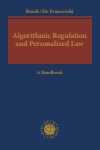Algorithmic Regulation and Personalized Law
A Handbook
Abstract
This Handbook explores the ways in which the use of big data analytics and artificial intelligence could recalibrate the relationship between law and individuality and change the foundational structures of our legal systems. In this perspective, the volume contributes to the emerging literature on "granular law" or "personalized law". Bringing together contributions by eminent scholars from both sides of the Atlantic, it aims to serve both as a gateway to this emerging and promising field and as a catalyst for new scholarly research. In particular, this Handbook explores the concept of personalized law, its implementation in contract, consumer and tort law, as well as the related implications for behavioural sciences, smart contracts, non discrimination and enforcement.
Zusammenfassung
This Handbook explores the ways in which the use of big data analytics and artificial intelligence could recalibrate the relationship between law and individuality and change the foundational structures of our legal systems. In this perspective, the volume contributes to the emerging literature on "granular law" or "personalized law". Bringing together contributions by eminent scholars from both sides of the Atlantic, it aims to serve both as a gateway to this emerging and promising field and as a catalyst for new scholarly research. In particular, this Handbook explores the concept of personalized law, its implementation in contract, consumer and tort law, as well as the related implications for behavioural sciences, smart contracts, non discrimination and enforcement.

